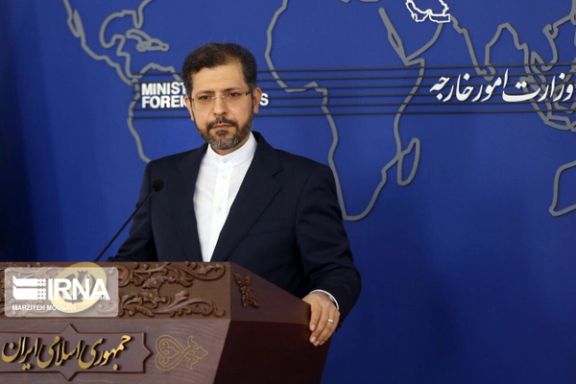Iran Says Talks With Saudi Arabia On 'More Serious Path', Yemen Included

Iran's foreign ministry spokesman said Monday that talks with Saudi Arabia are now on a "more serious path", including discussion on resolving Yemen's conflict.
Saeed Khatibzadeh who was speaking at his weekly press conference said contacts have continued "uninterruptedly" between the two sides and messages have kept flowing. "The biggest focus has been on bilateral and regional issues, particularly the Persian Gulf region," he said adding that the issue of "Yemen has been part of the talks between the two sides". Efforts were being made to improve peace and stability in the Persian Gulf through better relations between Tehran and Riyadh, he said.
Iran and a Saudi Arabia-led coalition consisting mostly of Gulf Arab states support opposing sides in the Yemeni civil war since 2014. Many refer to the war in Yemen as a proxy conflict between Iran and Saudi Arabia. The war has been in a military stalemate for years, with the Iran-backed Houthis holding most northern regions of the war-ravaged country.
Khatibzadeh also told reporters that Iran is happy for the talks to continue in Baghdad and there is no need to change that.
Saudi Arabia and Iran held direct talks earlier this year brokered by Baghdad and vowed to continue the process. New president Ebrahim Raisi (Raeesi) has stressed his intention to improve relations with the Arab states in the Persian Gulf and some analysts regard this as reflected in the appointment of Amir-Abdollahian, who held responsibility for Arab affairs as deputy foreign minister (2011-16) and was ambassador to Bahrain from 2007 to 2010.
In response to a question on rumors that Lebanon had refused fuel to Amir-Abdollahian's plane during his recent visit to Beirut and that the delegation had to re-route to Damascus to take fuel before returning to Tehran, Khatibzadeh said the foreign minister's visit to Damascus had been planned ahead and Iran had not put any fuel requests to the Lebanese government.
In a tweet Sunday, Ramez Al-Kadi, a senior news reporter for Lebanon's Al Jadeed TV, claimed that Rafic Hariri International Airport had refused to supply fuel to the foreign minister's plane for fear of US sanctions and the Iranian delegation had to go to Damascus to fuel the plane. The original tweet has been removed but its screenshots are still available.
"There are some who don't want these trips to have success and make these insinuations," Khatibzadeh said
In response to another question, Iran's spokesman insisted that bases used by Iranian opposition Kurdish groups and parties in Kurdistan Autonomous Region (KAR) must be dismantled. "They can't be sources of insecurity against us, both Kurds and the Iraqi government know this."
Iranian Kurdish separatist and opposition groups have bases in northern Iraq and Tehran often says they infiltrate into its territory for operations against government targets. Iran last month used artillery and armed drones to attack targets in northern Iraq that it said were insurgent bases. Yahya Rahim-Safavi, the military adviser to Supreme Leader Ali Khamenei, warned Wednesday that Iran would not accept “any bordering country” hosting "anti-Iran terrorist groups."